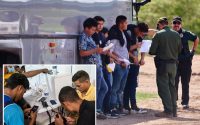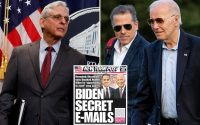Trump prosecutor Fani Willis’ father was top Black Panther
The father of the Georgia district attorney prosecuting Donald Trump was a prominent Black Panther who called police the “enemy,” new recordings have revealed.
John C. Floyd III, whose daughter Fani Willis is the Fulton County, Ga., district attorney, told academic researchers that he considered police in his native Los Angeles in the 1960s to be an “occupying army” that was “nothing but trouble.”
Floyd, now 80, also called a prominent white politician of the era a “Texas cracker.” And he suggested that he believed conspiracy theories that Malcolm X was assassinated by the CIA.
Floyd is extremely close to his daughter Willis, who has brought a sprawling anti-racketeering case against the former president and 18 others — including his personal attorney Rudy Giuliani and his White House chief of staff Mark Meadows — alleging that they plotted to overturn the 2020 election results in Georgia.


Trump on Thursday formally entered a not guilty plea a week after he was booked and mugshotted at the county jail.
Willis told The Post she speaks to her father as much as 10 times a day, and that his values continued to guide her. She did not directly address his past as a Black Panther.
“I have an absolutely amazing father and I’m very privileged to have been raised by such a great man,” Willis told The Post. “My father taught me that every single person is entitled to dignity and respect no matter who they are — no matter their race, religion or socio-economic status.
“And those things run through my veins,” she said. “It’s the way I try to treat people every single day: They’re entitled to dignity and respect no matter who they are.”


Until now, little has been known about Floyd beyond brief details, but it can now be revealed that he was a high-ranking member of the Black Panthers in Los Angeles.
Floyd was a founding member in 1967, and at one point chairman, of the Black Panther Political Party, a faction of the Black Panthers that was more moderate than the others. Floyd became a defense attorney after splitting from the Panthers in the early 1970s.
But before then, he told an interview for California State University’s Tom & Ethel Bradley Center, he was so high up in the Black Panthers that he became friends with Martin Luther King.
Speaking to the Bradley Center for its “Black Panther Archives” series, Floyd said that growing up in Inglewood, Los Angeles, he and other African Americans never went to the police despite the area being riddled with crime.


He said: “I grew up here and I have remarked to myself: As many car break-ins, house break-ins, assaults, I never the whole time I grew up in Los Angeles ever remember anyone calling the police department, because we considered LAPD to be the enemy.
“We thought they were nothing but trouble, they weren’t there to help us. I must have been 20 years old before I saw ‘to protect and serve’ (the LAPD motto) and wondered in my own mind, ‘Is that what police are supposed to do?’ because we saw them as an occupying army.”
Floyd helped to found the Student Nonviolent Coordinating Committee in Los Angeles, as its sit-ins against segregated lunch counters in the Jim Crow South spread.
But by the mid-1960s, there were tensions between black groups in Los Angeles, and the prominent California Democratic politician Jesse M. Unruh, at the time the speaker of the state assembly, intervened to mediate. Floyd said Unruh, nicknamed “Big Daddy,” was a “fat Texas cracker.”

He said: “I was so p—ed off, how could this Texas cracker come here and run the black community. I was just livid.”
In 1967, the Los Angeles Times reported that Floyd, then a 24-year-old teacher, helped found the Black Panther Political Party (BPPP) at a meeting, saying: “Malcolm X is going to be our patron saint. Our political philosophy is black nationalism.”
He told the Sacramento Bee that he was “sick of the Democratic Party,” and listed the BPPP’s aims as including “political power for the black community.”
In 1973, when he was an aide to the campaign by Sam Bradley to be Los Angeles’ first black mayor, he was accused of being part of violence and denied it, saying he was “to the right” of much of the black power movement.

In the interviews, Floyd said he had met “two prophets” in his life: Malcolm X, murdered in 1965, and King, assassinated in 1968.
Floyd was also a close acquaintance of Huey P. Newton, the leader of the Black Panther Party, which was more militant than, but allied with, Floyd’s Black Panther Political Party.
Floyd met Malcolm X for the first time when he was just 15 and was amazed while watching him on TV interviews, he said.
Floyd said: “I don’t want somebody to think I was a kook or something about that, but I wonder about all of these conspiracy theories.

“If you know anything about [longtime FBI Director] J. Edgar Hoover, he talked about how he did not want the rise of a Black Messiah.
“I know that the CIA was extremely concerned about Malcolm having been in Africa and having done the Hajj [Islamic pilgrimage to Mecca]. I wonder about Malcolm’s assassination — how somebody could kill Malcolm and it would seem like it was a setup, and the escape car was the same car that Malcolm had driven to the Audubon Ballroom.”
Adding fuel to Floyd’s suspicions was that several black groups were set to unify behind Malcolm X, including Newton’s party, right before he was killed.

Describing the last time he saw King, Floyd said the civil rights icon told him: “The uncommitted life is not worth living.”
Willis was born in 1971 in Inglewood and, when she was in the first grade, moved to Washington with her father, who became a criminal defense attorney and is said to have become disillusioned with the Black Panther movement.
Willis has claimed she was raised by a “single dad” and it is unclear what happened to her mother. Floyd remarried in 1989 but his second wife died in 2012 due to complications from a brain tumor.
In an interview with South Atlanta magazine, Willis described how when she was 9, her father would take her to court with him on Saturdays when he was working.

She wrote that after that, her “destiny was set” and she wanted to follow in his footsteps.
Floyd told the Bradley Center interviewer that he dated the civil rights activist Angela Davis in the late 1960s.
She was a member of the Communist Party USA and in 1970 became the third woman ever to be placed on the FBI’s Most Wanted list.
Davis was accused of involvement in kidnappings and murders related to the armed seizure of a courthouse in Marin County, California.

She was jailed for 16 months amid a huge campaign to free her which was supported by John Lennon and Yoko Ono, who wrote the song “Angela,” and by The Rolling Stones, who wrote “Sweet Black Angel.”
Davis was acquitted in 1972 and became a high-profile advocate for prison reform. In a 1974 memoir, “Free,” she mentioned Floyd twice, as chairman of the Black Panther Political Party in 1968, but did not say if they dated.
Willis told The Post: “You’re not the first time I’ve ever heard that, let’s say that.”
Attempts to reach Davis were unsuccessful.


